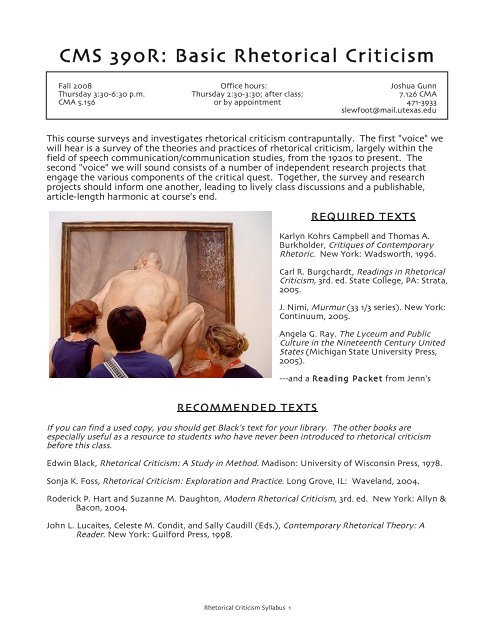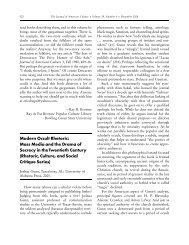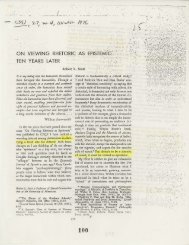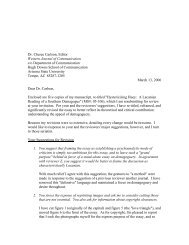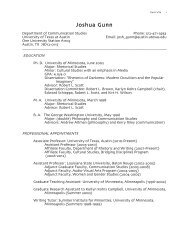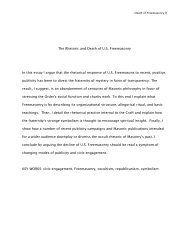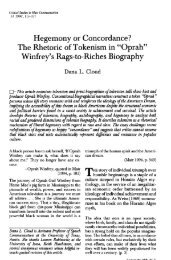CMS 390R: Basic Rhetorical Criticism
CMS 390R: Basic Rhetorical Criticism
CMS 390R: Basic Rhetorical Criticism
You also want an ePaper? Increase the reach of your titles
YUMPU automatically turns print PDFs into web optimized ePapers that Google loves.
<strong>CMS</strong> <strong>390R</strong>: <strong>Basic</strong> <strong>Rhetorical</strong> <strong>Criticism</strong><br />
Fall 2008<br />
Thursday 3:30-6:30 p.m.<br />
CMA 5.156<br />
Office hours:<br />
Thursday 2:30-3:30; after class;<br />
or by appointment<br />
<strong>Rhetorical</strong> <strong>Criticism</strong> Syllabus 1<br />
Joshua Gunn<br />
7.126 CMA<br />
471-3933<br />
slewfoot@mail.utexas.edu<br />
This course surveys and investigates rhetorical criticism contrapuntally. The first "voice" we<br />
will hear is a survey of the theories and practices of rhetorical criticism, largely within the<br />
field of speech communication/communication studies, from the 1920s to present. The<br />
second "voice" we will sound consists of a number of independent research projects that<br />
engage the various components of the critical quest. Together, the survey and research<br />
projects should inform one another, leading to lively class discussions and a publishable,<br />
article-length harmonic at course's end.<br />
RECOMMENDED TEXTS<br />
REQUIRED TEXTS<br />
Karlyn Kohrs Campbell and Thomas A.<br />
Burkholder, Critiques of Contemporary<br />
Rhetoric. New York: Wadsworth, 1996.<br />
Carl R. Burgchardt, Readings in <strong>Rhetorical</strong><br />
<strong>Criticism</strong>, 3rd. ed. State College, PA: Strata,<br />
2005.<br />
J. Nimi, Murmur (33 1/3 series). New York:<br />
Continuum, 2005.<br />
Angela G. Ray. The Lyceum and Public<br />
Culture in the Nineteenth Century United<br />
States (Michigan State University Press,<br />
2005).<br />
---and a Reading Packet from Jenn's<br />
If you can find a used copy, you should get Black's text for your library. The other books are<br />
especially useful as a resource to students who have never been introduced to rhetorical criticism<br />
before this class.<br />
Edwin Black, <strong>Rhetorical</strong> <strong>Criticism</strong>: A Study in Method. Madison: University of Wisconsin Press, 1978.<br />
Sonja K. Foss, <strong>Rhetorical</strong> <strong>Criticism</strong>: Exploration and Practice. Long Grove, IL: Waveland, 2004.<br />
Roderick P. Hart and Suzanne M. Daughton, Modern <strong>Rhetorical</strong> <strong>Criticism</strong>, 3rd. ed. New York: Allyn &<br />
Bacon, 2004.<br />
John L. Lucaites, Celeste M. Condit, and Sally Caudill (Eds.), Contemporary <strong>Rhetorical</strong> Theory: A<br />
Reader. New York: Guilford Press, 1998.
ASSIGNMENTS AND GRADING<br />
Grades will be determined on the basis of written assignments and participation in class (namely<br />
working with a peer evaluator). Please note: all seminars in rhetorical criticism will kick your<br />
proverbial ass. They always do, no matter where and with whom you take them. Although<br />
when I took this seminar with Karlyn Kohrs Campbell my butt was most definitely kicked,<br />
understand my motive with this course is not to perpetuate some twisted cycle of abuse. The<br />
difficulty is due to the one-two punch of reading theory about criticism and then trying to<br />
produce a critical reading yourself. In other words, you're trying to do two related things at<br />
once, and that creates a tough workload. I'm afraid there's just no way around the intensity of<br />
the course. You have been warned!<br />
This said, here's the graded stuff:<br />
Project Proposal (required but not graded; due September 4): This short, 2-3 page proposal<br />
identifies and describes the critical object that you will analyze during the course. In the proposal<br />
you will also describe the reasons for selecting the object. Please choose an object you are very<br />
interested in; objects that contribute to a larger project outside of class (e.g., a thesis or<br />
dissertation) are strongly encouraged. If you are new to rhetorical criticism, I strongly suggest<br />
you choose a speech, political or otherwise, that interests you.<br />
Intrinsic Analysis (200 points; due October 9th): This 10-12 page paper is a detailed, "close<br />
reading" of the object you have chosen. You are looking for structures, patterns, and other<br />
elements of the object that are not immediately obvious. Use the second chapter of Campbell<br />
and Burkholder as a guide. Peer evaluated.<br />
Extrinsic Analysis (200 points; due October 23rd): This 10-12 page paper is a contextual<br />
analysis of your object. The contexts for your object can vary widely depending on your interests<br />
or focus. Use the third chapter of Campbell and Burkholder as a guide. Peer evaluated.<br />
Critical/Theoretical Perspective (150 points; due October 30th): This shorter, 3-5 page paper<br />
identifies, explains, and justifies the theoretical or methodological frame, perspective, or<br />
approach you are planning to use to analyze and evaluate your object. In general, there should<br />
be some seemingly "natural" fit between object and approach. For example, a Jungian/mythical<br />
approach to The Da Vinci Code seems to fit alright, while cluster-agon analysis of the same does<br />
not. Let your object help you determine what perspective helps you to see what you otherwise<br />
wouldn't ordinarily see about your object. Use the fourth chapter of Campbell and Burkholder as<br />
a guide. Peer evaluated.<br />
Final Paper Submission (150 points; due November 13th): This is a full-blown, 25-30 page<br />
rhetorical criticism. This paper is due at the beginning of class promptly at 3:30 p.m. You cannot<br />
turn in your paper late; do not arrive to class late with your paper; do not wait until 2:30 p.m. the<br />
day of class to print-out your paper, as your printer cartridge will surely run out of ink. This paper<br />
draws on the previous analyses, but SHOULD NOT be a quilt of them. Rather, you should only<br />
utilize those parts of previous papers that make sense in your analysis. Use the fifth chapter of<br />
Campbell and Burkholder to get you thinking about the final stage of criticism, however, you<br />
needn't follow their "criteria of evaluation" for your own paper.<br />
Peer Reviews (50 points; due November 26th): Drawing on your own experience writing this<br />
semester, provide one to two pages of helpful feedback to your mystery author on how to<br />
improve his or her essay (single spaced). Begin by summarizing the argument as you understand<br />
it, and then follow with a succinct and easy to follow series of suggestions. Indicate in your<br />
review whether you would reject the essay for publication; suggest a revision and resubmission;<br />
or accept as is. See Josh's website for examples of good and bad peer reviews. Unnecessary<br />
meanness or cruelty will result in no credit.<br />
Paper Revision and Resubmission Letter (250 points; due December 12th): Using the<br />
suggestions of the editor and blind reviewers as your guide, revise your initial submission. Use<br />
your own judgment as to what suggestions you should follow and which you should ignore<br />
(paying special attention to the editor's summary). As you revise your essay, compose a<br />
"response letter" in which you detail the changes you made to your manuscript. Use Josh's<br />
<strong>Rhetorical</strong> <strong>Criticism</strong> Syllabus 2
website and examples in your course packet as a guide for writing your response letter. Please<br />
understand the letter is AS important as the revised essay.<br />
Attendance policy: Attendance is a precondition of satisfactory participation in this course—<br />
including those who are only auditing. For every 3 days missed, 10% will be subtracted from your<br />
total possible points earned.<br />
A Note on Peer Evaluations and Grading: Ideally this course would have a small, 5-7 person<br />
enrollment. Unfortunately, the number of students admitted to our program every year makes this<br />
ideal just that: ideal, but not real. Consequently, you will be required to work throughout the course<br />
with an assigned "partner" who will provide you feedback on all assignments except the proposal,<br />
initial paper submission, and then the resubmission. For the intrinsic, extrinsic, and<br />
critical/theoretical perspective papers you will need to bring two copies: one for your peer evaluator<br />
and one for Josh. You will receive full credit/points for the assignment as long as you follow<br />
directions and turn the project in on time. You will also receive full credit for your peer evaluation of<br />
the initial submission and final paper submission as long as you follow directions. To put this bluntly:<br />
by following directions and turning in your work on time, you can earn a "C" in the class. Bs and As<br />
will be determined solely by your performance on the final submission letter and paper. This said,<br />
lazy or half-baked submissions on the "credit-only" assignments will not receive full credit. The point<br />
I'm trying to make here is that you have no reason to worry about your grade as long as you are<br />
doing your best work!<br />
On the Quarterly Journal of Bleach<br />
Over the past decade it has become increasingly important for graduate students to pursue<br />
publication prior to completing their degrees. This expectation did not exist for past generations;<br />
today, however, the difference between getting a tenure-track job at an academic institution and<br />
lesser-paying visiting or adjunct position is often determined by a publication record. Insofar as the<br />
Communication Studies program at the University of Texas at Austin is focused on research, this<br />
course is designed specifically to help you produce and publish rhetorical criticism.<br />
To this end, the writing component of the class will be modeled on the "blind review" submission<br />
process at a typical rhetorical studies journal. Our journal will be titled the Quarterly Journal of<br />
Bleach, and each class member is sits on the editorial board. When you submit your first, complete<br />
essay on November 13th, you shall submit two copies: one copy will be a "hard copy" and will have<br />
your name on it, while the other copy will be via email and should be devoid of any self-reference<br />
whatsoever. As editor, I will then match your "blind," electronic version up with TWO peer<br />
reviewers. You will thus be required to read and respond to TWO of your classmate's papers and<br />
write a response to each (1 single spaced page each, nothing exhaustive unless you are simply feeling<br />
generous). On November 26th you will submit these reviews to me as email attachments (again,<br />
without any self reference). I will then write a cover letter as the editor summarizing the reviews<br />
and adding my own thoughts about each manuscript and return them to you on the last day of class.<br />
Your final grade will thus be determined on two things: (1) how you revise your paper in light of the<br />
reviews; and (2) how you formally address the concerns of the editor and reviewer in a resubmission<br />
cover letter. These items are due on finals day, Friday, December 12th by noon.<br />
You can find a detailed run-down of this process, as well as a number of example reviews and<br />
resubmission letters, at the following website:<br />
http://www.joshiejuice.com/psycho_publish/psycho_publishing.html<br />
COURSE POLICIES<br />
If you require any disability-related accommodations to participate in this class, please contact me as<br />
soon as possible.<br />
On Cursing: You can curse an idea or embellish an expression, but do not curse your fellow<br />
classmates.<br />
<strong>Rhetorical</strong> <strong>Criticism</strong> Syllabus 3
Late Papers: No late papers will be accepted. Acts of God/Goa/Nature/Alien Slave Masters may<br />
find exception.<br />
Incompletes: An incomplete will not be allowed; withdrawals are your best option.<br />
Complaints and grade disputes: You should submit grade disputes in writing within one week<br />
of receiving the contested grade. All other complaints are welcome during office hours or by email.<br />
Academic misconduct: If you cheat you will receive an "F" for the course and royally piss me off.<br />
Acknowledgements<br />
This syllabus was created by raiding the ideas of the syllabi of a number of colleagues. My thanks to<br />
Barbara Biesecker, Carole Blair, Karlyn Kohrs Campbell, Dana Cloud, Rod Hart, Marty Medhurst, John<br />
Murphy, Angela Ray, Ed Schiappa, Rachel Smith, and Kirt Wilson.<br />
COURSE SCHEDULE<br />
This schedule is tentative. Departures will be announced in advance. All the readings listed below<br />
the date and topic should be read for that date. The "focal reading" will function as an illustration of<br />
the theoretical and methodological issues raised in the other readings, as well as a common object for<br />
class discussion. The Readings are denoted with the following abbreviations: PR = packet reading;<br />
RRC = Readings in <strong>Rhetorical</strong> <strong>Criticism</strong>; CCR = Critiques of Contemporary Rhetoric.<br />
August 28th: What is <strong>Rhetorical</strong> <strong>Criticism</strong>?<br />
Campbell, Karlyn Kohrs and Thomas A. Burkholder,"Rhetoric, Language, and <strong>Criticism</strong>," CCR 2-16.<br />
Roderick P. Hart and Suzanne M. Daughton, "The <strong>Rhetorical</strong> Perspective." In Modern <strong>Rhetorical</strong><br />
<strong>Criticism</strong>, 3rd. ed. Boston: Allyn and Bacon, 2005), 1-20. PR<br />
Roderick P. Hart and Suzanne M. Daughton, "The Critical Perspective." In Modern <strong>Rhetorical</strong><br />
<strong>Criticism</strong>, 3rd. ed. Boston: Allyn and Bacon, 2005), ----. PR<br />
James Jasinski, "The Status of Theory and Method in <strong>Rhetorical</strong> <strong>Criticism</strong>." Western Journal of<br />
Communication 65 (2001): 249-270.<br />
Lloyd F. Bitzer, "The <strong>Rhetorical</strong> Situation." Philosophy and Rhetoric 1 (1968): 1-14. RRC<br />
Richard E. Vatz, "The Myth of the <strong>Rhetorical</strong> Situation." Philosophy and Rhetoric 6 (1973): 154-161.<br />
PR<br />
Dilip Parameshwar Gaonkar, "Object and Method in <strong>Rhetorical</strong> <strong>Criticism</strong>: From Wichelns to Leff and<br />
McGee." Western Journal of Communication 54 (1990): 290-316. PR<br />
Focal Reading:<br />
David A. Frank and Mark Lawrence McPhail, "Barack Obama's Address to the 2004 Democratic<br />
National Convention: Trauma, Compromise, Consilience, and the (Im)possibility of Racial<br />
Reconciliation." Rhetoric & Public Affairs 8 (2005): 571-594. PR<br />
September 4th: The Values and Purposes of <strong>Rhetorical</strong> <strong>Criticism</strong><br />
PROJECT PROPOSAL IS DUE!<br />
<strong>Rhetorical</strong> <strong>Criticism</strong> Syllabus 4
Mike Allen, "Heavy Lies the Editor's Fingers on the Keyboard." Communication Studies 54 (2003):<br />
354-358. PR<br />
Sandra J. Berkowitz, "Originality, Conversation and Reviewing <strong>Rhetorical</strong> <strong>Criticism</strong>." Communication<br />
Studies 54 (2003): 359-363. PR<br />
Barry Brummett, "Double Binds in Publishing <strong>Rhetorical</strong> Studies." Communication Studies 54 (2003):<br />
364-369. PR<br />
Joshua Gunn, "Publishing Peccadilloes and Idioms of Disposition: Views From the Habitus of<br />
Scholarly Adolescence." Communication Studies 54 (2003): 370-377. PR<br />
Steven B. Hunt, "An Essay on Publishing Standards For <strong>Rhetorical</strong> <strong>Criticism</strong>." Communication Studies<br />
54 (2003): 378-384. PR<br />
Catherine Helen Palczewski, "What is 'Good <strong>Criticism</strong>'? A Conversation in Progress." Communication<br />
Studies 54 (2003): 385-391. PR<br />
John W. Jordan, Kathryn M. Olson, and Steven R. Goldzwig. "Continuing the Conversation on 'What<br />
Constitutes Publishable <strong>Rhetorical</strong> <strong>Criticism</strong>?': A Response." Communication Studies 54<br />
(2003): 392-402. PR<br />
Focal Reading:<br />
Forbes Hill, "Conventional Wisdom—Traditional Form—The President's Message of November 3,<br />
1969." Quarterly Journal of Speech 58 (1972): 373-386. RRC 138-150.<br />
Please Note: This essay initiated an important debate in rhetorical studies that continued in Karlyn<br />
Kohrs Campbell, "'Conventional Wisdom—Traditional Form': A Rejoinder," Quarterly Journal<br />
of Speech 58 (1972): 451-454; Forbes Hill, "Reply to Professor Campbell," Quarterly Journal of<br />
Speech 58 (1972): 454-460; and Karlyn Kohrs Campbell, "Response to Forbes Hill," Central<br />
States Speech Journal 34 (1983): 126-127. Also see Karlyn Kohrs Campbell, "The Rhetoric of<br />
Mythical America Revisited," in CCR 202-212.<br />
September 11th: The Origins of Speech/<strong>Rhetorical</strong> <strong>Criticism</strong><br />
GUEST SPEAKER: Roderick P. Hart, University of Texas at Austin<br />
Herman Cohen, excerpts from The History of Speech Communication: The Emergence of a Discipline,<br />
1914-1945 (Annandale, VA: Speech Communication Association, 1994), 29-42. PR<br />
William M. Keith, "Origins of Speech Pedagogy." In his Democracy as Discussion: Civic Education and<br />
the American Forum Movement (Lanham, MI: Lexington Books, 2007), 19-57. PR<br />
William M. Keith, "Crafting a Usable History." Quarterly Journal of Speech 93 (2007): 345-348. PR<br />
David Beard, "Out of the Aerie Realm of Intellectual Firmament." Quarterly Journal of Speech 93<br />
(2007): 349-351. PR<br />
Gerry Philipsen, "The Early Career Rise of "Speech" in Some Disciplinary Discourse, 1914-1946."<br />
Quarterly Journal of Speech 93 (2007): 353-354. PR<br />
Herbert A. Wichelns, "The Literary <strong>Criticism</strong> of Oratory," Studies in Rhetoric and Public Speaking in<br />
Honor of James Albert Winans, edited by A. M. Drummond (New York: The Century Co.,<br />
1925), RRC 3-28.<br />
Ernest J. Wrage, "Public Address: A Study in Social and Intellectual History." Quarterly Journal of<br />
Speech 33 (1947): 451-457. RRC 28-34.<br />
<strong>Rhetorical</strong> <strong>Criticism</strong> Syllabus 5
Lester Thonssen and Craig Baird, excerpts from Speech <strong>Criticism</strong>: The Development of Standards for<br />
<strong>Rhetorical</strong> Appraisal (Ronald Press Co., 1948). PR<br />
Wayland Maxfield Parrish, "The Study of Speeches." American Speeches, edited by Wayland Maxfield<br />
Parish and Marie Hochmuth Nichols (New York: Longmans, Green and Co., 1954), RRC 34-46<br />
Focal Reading<br />
Carroll C. Arnold, "Lord Thomas Erskine: Modern Advocate." Quarterly Journal of Speech 44 (1958):<br />
17-30. RRC 148-161.<br />
September 18th: Disciplinary Transitions in <strong>Rhetorical</strong> Studies<br />
GUEST SPEAKER: James Darsey, Georgia State University<br />
Martin J. Medhurst, "Celebrating the Life of Edwin Black: The Myth, the Man, and the Memory."<br />
Rhetoric & Public Affairs 10 (2007) 476-480. PR<br />
James Darsey, "Edwin Black and the First Persona," Rhetoric and Public Affairs 10 (2007): 501-507.<br />
PR<br />
Stephen E. Lucas, "The Legacy of Edwin Black," Rhetoric and Public Affairs 10 (2007): 509-519. PR<br />
Edwin Black, excerpts from <strong>Rhetorical</strong> <strong>Criticism</strong>: A Study in Method (Madison: University of<br />
Wisconsin Press, 1978 [1965]), RRC 46-58.<br />
Edwin Black, "The Second Persona." Quarterly Journal of Speech 56 (1970): 109-169. RRC 87-96.<br />
Lawrence W. Rosenfield, "The Anatomy of Critical Discourse." Speech Monographs 35 (1968): 50-69.<br />
RRC 67-86.<br />
Stephen E. Lucas. "The Schism in <strong>Rhetorical</strong> Scholarship." Quarterly Journal of Speech (1981): 1-20.<br />
RRC 87-106.<br />
Focal Reading<br />
James Darsey, excerpts from The Prophetic Tradition and Radical Rhetoric in America (New York:<br />
New York University Press, 1997), PR<br />
October 2nd: Fighting for the "Text": Close Textual <strong>Criticism</strong> (as Analysis)<br />
Sigmund Freud, excerpts from The Interpretation of Dreams, trans. Joyce Crick (New York: Oxford<br />
University Press, 1999 [1900]), PR<br />
Rene Welleck and Austin Warren, excerpts from Theory of Literature, 3rd ed. (San Diego, CA:<br />
Harcourt Brace & Co., 1956), PR<br />
Hans-Georg Gadamer, "Rhetoric and Hermeneutics," trans. Joel Weinsheimer. Rhetoric and<br />
Hermeneutics in Our Time, edited by Walter Jost and Michael Hyde (New Haven: Yale<br />
University Press, 1997): 45-59. PR<br />
Michael C. Leff and Gerald P. Mohrmann. "Lincoln at Cooper Union: A <strong>Rhetorical</strong> Analysis of the<br />
Text." Quarterly Journal of Speech 60 (1974): 346-358. RRC 174-186.<br />
Michael C. Leff. "Lincoln at Cooper Union: Neo-Classical <strong>Criticism</strong> Revisited." Western Journal of<br />
Communication 65 (2001): 323-248. PR<br />
<strong>Rhetorical</strong> <strong>Criticism</strong> Syllabus 6
Michael Leff. "Dimensions of Temporality in Lincoln's Second Inaugural." Communication Reports 1<br />
(1988): 26-31. RRC 646-469.<br />
Angela G. Ray, excerpt from The Lyceum and Public Culture in The Nineteenth Century United States<br />
(East Lansing: Michigan State University Press, 2005), TBA<br />
Amy R. Slagell, "Anatomy of a Masterpiece: A Close Textual Analysis of Arbraham Lincoln's Second<br />
Inaugural Address." Communication Studies 42 (1991): 155-171.<br />
Karlyn Kohrs Campbell and Thomas R. Burkholder, "Descriptive Analysis" CCR 17-31.<br />
Focal Reading<br />
J. Nimi, Murmur (33 1/3 series). New York: Continuum, 2005.<br />
October 9th: Burke-O-Rama: Dramatism Makes a Splash<br />
INTRINSIC/DESCRIPTIVE ANALYSIS DUE<br />
GUEST SPEAKER: Barry Brummett, University of Texas at Austin<br />
Joseph R. Gusfield, "Introduction." Kenneth Burke on Symbols and Society, edited by Joseph R.<br />
Gusfield (Chicago: University of Chicago Press, 1989), 1-49. PR<br />
Kenneth Burke, "The Rhetoric of Hitler's Battle," in The Philosophy of Literary Form: Studies in<br />
Symbolic Action, 3rd ed. (Berkeley: University of California Press, 1973), 191-220. RRC 188-<br />
202. PR<br />
Kenneth Burke, "Dramatistic Method" and "Ways of Placement." Kenneth Burke on Symbols and<br />
Society, edited by Joseph R. Gusfield (Chicago: University of Chicago Press, 1989), 135-157. PR<br />
Brian L. Ott and Eric Aoki, "The Politics of Negotiating Public Tragedy: Media Framing of the<br />
Matthew Shepard Murder." Rhetoric & Public Affairs 5 (2002): 483–505. RRC 220-237.<br />
Mari Boor Tonn, Valerie A. Endress, and John N. Diamond, "Hunting and Heritage on Trial in Maine:<br />
A Dramatistic Debate Over Tragedy, Tradition, and Territory." Quarterly Journal of Speech 79<br />
(1993): 165-181. RRC 203-219.<br />
Barry Brummett. "Perfection and the Bomb: Nuclear Weapons, Teleology, and Motives." Journal of<br />
Communication 39 (1989): 85-95. PR<br />
Barry Brummett. "Electric Literature As Equipment For Living: Haunted House Films." Critical<br />
Studies in Mass Communication 2 (1985): 247-261. PR<br />
Focal Reading<br />
Barry Brummett, "A Pentadic Analysis of Ideologies in Two Gay Rights Controversies." Central States<br />
Speech Journal 30 (1979): 250-261. PR<br />
October 16th: Contextualizing <strong>Rhetorical</strong> Objects<br />
GUEST SPEAKER: Angela G. Ray, Northwestern University<br />
Stephen Lucas, "The Renaissance of American Public Address: Text and Context in <strong>Rhetorical</strong><br />
<strong>Criticism</strong>." Quarterly Journal of Speech 74 (1988): 241-260. PR<br />
<strong>Rhetorical</strong> <strong>Criticism</strong> Syllabus 7
Gerald Philipsen, "Mayor Daley's Council Speech: A Cultural Analysis." Quarterly Journal of Speech 72<br />
(1986): 247-260. PR<br />
Kirt H. Wilson. "The Paradox of Lincoln's <strong>Rhetorical</strong> Leadership." Rhetoric and Public Affairs 3 (2000):<br />
15-32. PR<br />
Susan Zaeske. "Signatures of Citizenship: The Rhetoric of Women's Antislavery Petitions. Quarterly<br />
Journal of Speech 88 (2002): 147-168.<br />
Karlyn Kohrs Campbell and Thomas R. Burkholder, "Historical-Contextual Analysis." CCR 49-72.<br />
Focal Reading<br />
Angela G. Ray, excerpts from The Lyceum and Public Culture in the Nineteenth Century United<br />
States (Michigan State University Press, 2005), TBA<br />
October 23rd: The Disciplined Compromise: Genre <strong>Criticism</strong><br />
EXTRINSIC ANALYSIS DUE!!!<br />
Roderick P. Hart, "Theory-building and <strong>Rhetorical</strong> <strong>Criticism</strong>: An Informal Statement of Opinion."<br />
Central States Speech Journal 27 (1976): 70-77.<br />
Roderick P. Hart, "Contemporary Scholarship in Public Address: A Research Editorial." Western<br />
Journal of Speech Communication 50 (1986): 283-295.<br />
Adena Rosemarin, excerpts from The Power of Genre (Minneapolis: University of Minnesota Press,<br />
1985), 3-51. PR<br />
Karlyn Kohrs Campbell and Kathleen Hall Jamieson. "Form and Genre in <strong>Rhetorical</strong> <strong>Criticism</strong>: An<br />
Introduction." Form and Genre: Shaping <strong>Rhetorical</strong> Action, eds. Karlyn Kohrs Campbell and<br />
Kathleen Hall Jamieson (Falls Church, VA: Speech Communication Association, 1977), 9-32.<br />
Reprinted in the second edition of Burgchardt, pp. 437-453; PR<br />
Carolyn R. Miller, "Genre as Social Action." Quarterly Journal of Speech (1984): 1561-167. PR<br />
Thomas Conley, "The Linnaean Blues: Thoughts on the Genre Approach." Form and Genre: Shaping<br />
<strong>Rhetorical</strong> Action, eds. Karlyn Kohrs Campbell and Kathleen Hall Jamieson (Falls Church, VA:<br />
Speech Communication Association, 1977), 59-78. PR<br />
Karlyn Kohrs Campbell and Kathleen Hall Jamieson. "Inaugurating the Presidency." Form, Genre, and<br />
the Study of Political Discourse, eds. Herbert W. Simons and Aram A. Aghazarian (University<br />
of South Carolina Press, 1986), RRC<br />
Joshua Gunn, "The Rhetoric of Exorcism: George W. Bush and the Return of Political Demonology."<br />
Western Journal of Communication 68 (Winter 2004): 1-23. PR<br />
Karlyn Kohrs Campbell and Thomas R. Burkholder, "Selecting or Inventing a Critical Perspective,"<br />
CCR 73-108.<br />
Focal Reading<br />
Karlyn Kohrs Campbell, "Stanton's 'The Solitude of Self': A Rationale for Feminism." Quarterly Journal<br />
of Speech 66 (1980): 304-312. RRC 480-488.<br />
<strong>Rhetorical</strong> <strong>Criticism</strong> Syllabus 8
October 3oth: Public Sphere and Social Movement <strong>Criticism</strong><br />
CRITICAL/THEORETICAL PERSPECTIVE DUE!!!<br />
GUEST SPEAKER: Daniel Brouwer, Arizona State University<br />
Leland M. Griffin, "The Rhetoric of Historical Movements." Quarterly Journal of Speech 38 (1952):<br />
184-188. RRC<br />
Leland M. Griffin, "The <strong>Rhetorical</strong> Structure of the Antimasonic Movement." The <strong>Rhetorical</strong> Idiom:<br />
Essays in Rhetoric, Oratory, Language, and Drama (Cornell University Press, 1958). RRC<br />
Herbert W. Simons, "Requirements, Problems, and Strategies: A Theory of Persuasion for Social<br />
Movements." Quarterly Journal of Speech 56 (1970): 1-11. RRC<br />
Thomas G. Goodnight, "The Personal, Technical, and Public Spheres of Argument: A Speculative<br />
Inquiry Into the Art of Public Deliberation." Journal of American Forensic Association 18 (1982): 214-<br />
227. PR<br />
Michael C. McGee, "In Search of 'The People': A <strong>Rhetorical</strong> Alternative." Quarterly Journal of Speech<br />
61 (1975): 235-249. PR<br />
Charles E. Morris III and John M. Sloop, "What These Lips Have Kissed: Refiguring the Politics of<br />
Queer Public Kissing," Communication and Critical/Cultural Studies 3 (2006): 1-26. PR<br />
Dana Cloud, "Bringing Down Suharto: Globalization, the State, and Social Movement in Indonesia."<br />
Counterpublics and the State, edited by Robert Asen and Daniel C. Brouwer (Albany: State University<br />
of New York Press, 2001), 235-264. PR<br />
Daniel C. Brouwer, "ACT-ing Up in Congressional Hearings." Counterpublics and the State, edited by<br />
Robert Asen and Daniel C. Brouwer (Albany: State University of New York Press, 2001), 87-109. PR<br />
Daniel C. Brouwer, "From San Francisco to Atlanta and Back Again: Ideologies of Mobility and the<br />
Aids Quilts Search for a Homeland." Rhetoric and Public Affairs 10 (2007): 701-721. PR<br />
Focal Reading<br />
Daniel C. Brouwer, "Counterpublicity and Corporeality in HIV/AIDS Zines." Critical Studies in Media<br />
Communication 22 (2005): 351-357.<br />
November 6th: Narrative, Mythic, and Fantasy Theme <strong>Criticism</strong><br />
Walter R. Fisher, "Narration as Human Communication Paradigm: The Case of Public Moral<br />
Argument." Communication Monographs 51 (1984): 1-22. RRC<br />
William F. Lewis, "Telling America's Story: Narrative Form and the Reagan Presidency." Quarterly<br />
Journal of Speech 73 (1987): 267-279. RRC<br />
Bruce E. Gronbeck, "Rushing, Frentz, and the Matter of Psychological <strong>Rhetorical</strong> <strong>Criticism</strong>." Southern<br />
Communication Journal 71 (2006): 159-163. PR<br />
Thomas S. Frentz and Janice Hocker Rushing, "'Mother Isn't Quite Herself Today': Myth and<br />
Spectacle in The Matrix." Critical Studies in Media Communication 19 (2002): 64-87. PR<br />
<strong>Rhetorical</strong> <strong>Criticism</strong> Syllabus 9
Ernest G. Bormann, "Fantasy and <strong>Rhetorical</strong> Vision: The <strong>Rhetorical</strong> <strong>Criticism</strong> of Social Reality."<br />
Quarterly Journal of Speech 58 (1972): 396-407. RRC<br />
Ernest G. Bormann, "The Eagleton Affair: A Fantasy Theme Analysis." Quarterly Journal of Speech 59<br />
(1973): 143-159. RRC<br />
Joshua Gunn, "Refiguring Fantasy: Imagination and Its Decline in U.S. <strong>Rhetorical</strong> Studies." Quarterly<br />
Journal of Speech 92 (2006): 379-412. PR (Note: this essay unwittingly ruffled the feathers of<br />
fantasy theme devotees. See Ernest G. Bormann, John F. Cragan, and Donald C. Shields, "Defending<br />
Symbolic Convergence Theory from an Imaginary Gunn," Quarterly Journal of Speech 89 (2003):<br />
366-372; and Joshua Gunn, "Response," Quarterly Journal of Speech 89 (2003): 373.)<br />
Karlyn Kohrs Campbell and Thomas R. Burkholder, "Evaluation." CCR 109-131.<br />
Focal Reading<br />
Mark West and Chris Casey, "(Re)Enacting Frontier Justice: The Bush Administration's Tactical<br />
Narration of the Old West Fantasy After September 11." Quarterly Journal of Speech 92 (2006): 379-<br />
412.<br />
November 13th: Materialism and Ideology Critique<br />
Submission Draft of Final Paper is DUE!!!<br />
GUEST SPEAKER: James Arnt Aune, Texas A&M University<br />
Philip Wander. "The Ideological Turn in Modern <strong>Criticism</strong>." Central States Speech Journal 34 (1983): 1-<br />
18.<br />
Philip Wander. "The Third Persona: An Ideological Turn in <strong>Rhetorical</strong> Theory." Central States Speech<br />
Journal #% (1984): 197-216.<br />
Maurice Charland. "Constitutive Rhetoric: The Case of Peuple Quebecois." Quarterly Journal of<br />
Speech 73 (1987): 133-150.<br />
Michael Calvin McGee. "The 'Ideograph': A Link Between Rhetoric and Ideology." Quarterly Journal<br />
of Speech 66 (1980): 1-16.<br />
Dana Cloud, "'To Veil the Threat of Terror': Afghan Women and the in the<br />
Imagery of the U.S. War on Terrorism." Quarterly Journal of Speech 90 (2004): 285-306.<br />
Bryan J. McCann, "Therapeutic and Material hood: Ideology and the Struggle for Meaning<br />
in the Illinois Death Penalty Controversy." Communication and Critical/Cultural Studies 4 (2007):<br />
382-401.<br />
Biesecker, Barbara A. "Remembering World War II: The Rhetoric and Politics of National<br />
Commemoration at the Turn of the 21st Century." Quarterly Journal of Speech 88 (2002): 393-410.<br />
PR<br />
James Arnt Aune, "A Historical Materialist Theory of Rhetoric." American Communication Journal 6<br />
(2003): available http://acjournal.org/holdings/vol6/iss4/mcmcgee/aune.htm<br />
Focal Reading<br />
James Arnt Aune, excerpts from Selling the Free Market: The Rhetoric of Economic Correctness (New<br />
York: Guilford, 2002) TBA<br />
<strong>Rhetorical</strong> <strong>Criticism</strong> Syllabus 10
Wednesday, November 26: NO CLASS!<br />
Peer Reviews of Mystery Author are DUE via email by NOON!!!<br />
December 4th: The Last Day Kitchen Sink, or, <strong>Rhetorical</strong> <strong>Criticism</strong> Goes<br />
Critical/Cultural<br />
Raymie E. McKerrow, "Critical Rhetoric: Theory and Praxis." Communication Monographs 56 (1989):<br />
91-111. PR<br />
Carole Blair, Marsha S. Jeppeson, and Enrico Pucci, Jr. "Public Memorializing in Postmodernity: The<br />
Vietnam Veterans Memorial as Prototype." Quarterly Journal of Speech 77 (1991): 289-308. RRC<br />
Dana L. Cloud. "The Materiality of Discourse as Oxymoron: A Challenge to Critical Rhetoric." Western<br />
Journal of Communication 58 (1994): 141-163. PR<br />
Kent A. Ono and John M. Sloop, "The Critique of Vernacular Discourse." Communication Monographs<br />
62 (1995): 19-46. PR<br />
Ronald Walter Greene. "Another Materialist Rhetoric." Critical Studies in Mass Communication 15<br />
(1998): 21-41. PR<br />
Sloop, John M. "Disciplining the Transgendered: Brandon Teena, Public Representation, and<br />
Normativity." Western Journal of Communication 64 (2005): 165-189. PR<br />
Kyra Pearson, "The Trouble with Aileen Wuornos, Feminism's 'First Serial Killer,'" Communication and<br />
Critical/Cultural Studies 4 (2007): 256-275. PR<br />
Focal Reading<br />
Barbara A. Biesecker, "No Time For Mourning: The <strong>Rhetorical</strong> Production of the Melancholic Citizen-<br />
Subject in the War on Terror." Philosophy and Rhetoric 40 (2007): 147-169. PR<br />
Friday December 12th: Exam Period<br />
Revised Essays and Letters of Resubmission are due in Josh's CMA mailbox by NOON!<br />
<strong>Rhetorical</strong> <strong>Criticism</strong> Syllabus 11


